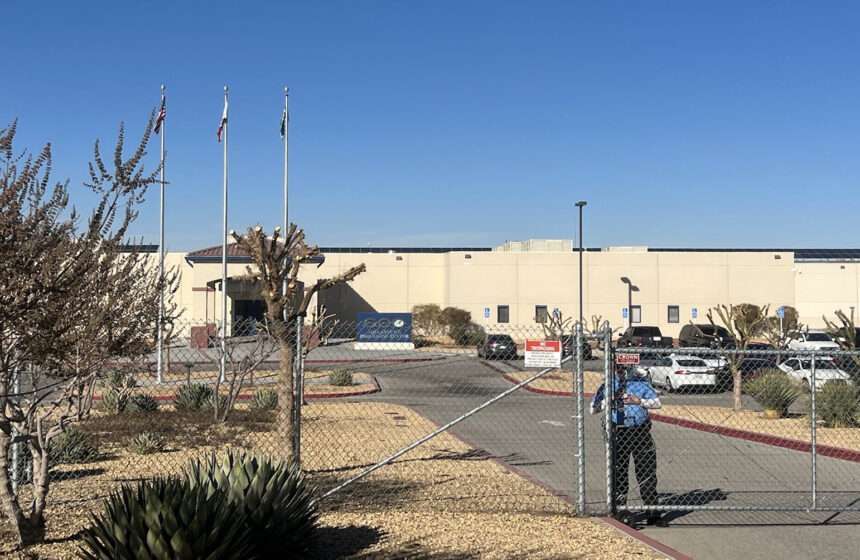Adelanto Detention Center. Photo by Nona Chai
Since its establishment nearly thirteen years ago, advocates have been pushing for the Adelanto Detention Center’s closure. “Immigrants detained at the detention center are dehumanized and subjected to cruel and unusual punishment, medical neglect, sexual abuse, assault, and unwarranted chemical tresspass,” says Eddie Torres of Inland Coalition for Immigrant Justice (ICIJ), an organizational founding member of the Shut Down Adelanto Coalition (SDA). SDA brings together legal service providers, grassroots groups, and directly impacted individuals to campaign for the just closure of the Adelanto Detention Center. By drawing from the environmental justice movement, SDA has fortified and demonstrated the connection between environmental justice and decarceration and motivated Adelanto stakeholders to achieve a just transition to a clean and safe economy.
Adelanto’s socioeconomic and environmental context fit well within the definition of an environmental justice community. The effects of historic redlining and segregation in the Inland Empire remain apparent in the city’s demographics: the 2022 US Census Bureau captured Adelanto as 67.9% Latino and 17.3% Black with 21% of the city living in poverty. Within seven miles of Adelanto, the George Air Force Base in Victorville devastated the air and water quality, leaving a toxic superfund site and an economic rift with its closure in 1992. Carceral facilities–including a federal prison, a county jail, the Adelanto Detention Center, and Desert View Annex, the expansion facility of the detention center–came to dominate the local economy along with warehousing, fostering reliance on polluting industries that fail to support socioeconomic attainment and community resilience. Constructing carceral and migrant detention centers close to superfund sites exposes detainees and workers to dangerous contaminants and exacerbates racialized health and wealth disparities, underscoring the need for a just transition in Adelanto.
SDA adopted an environmental justice framing to galvanize public support for closing the Adelanto Detention Center. In 2021, the coalition collaborated with Pitzer College students to conduct environmental justice research on carceral facilities in the high desert, including the Adelanto Detention Center. They led thirty members of the community, including elected officials, on a Toxic Tour of Adelanto which detailed environmental racism inside and outside of the Detention Center–from contamination left by the air force to the Detention Center’s irresponsible use of a toxic pesticide called HDQ Neutral–to demonstrate Adelanto’s dire need for a just transition away from a prison-based economy.
The campaign’s recent shift to include water justice constitutes another environmental justice consideration which works in favor of decarceration. Eddie began connecting water quality issues to the fight to close the Adelanto Detention Center after learning about a survey on Adelanto’s water quality that was conducted by Pitzer College in 2022. ICIJ collaborated with Pitzer College and city officials to form the Adelanto Water Justice Coalition which published the 2022 Adelanto Community Water Report. SDA also began publishing quarterly reports for congressional members on conditions inside of the Adelanto Detention Center, including water quality, worker rights, and more. By showing the community how water issues inside of the Center mirror what they experience at home, the campaign gained public support for closing the Detention Center. Clearly, as Eddie states, “the intersection with EJ fits right in” when it comes to immigrant justice and decarceration.
Through publicizing environmental justice concerns, SDA has built broad support for organizing the Adelanto Detention Center’s just closure. Water justice united city officials and the community around SDA’s cause, a major accomplishment given that the city has perceived SDA as its opposition in the past. The campaign has cultivated a positive relationship with the mayor and a portion of the city council, opening pathways to support the development of public resources and a just transition plan for Adelanto. “We’re seeing the real power of change and community on a local level, bringing in state partners, and securing funding,” says Eddie. “A tidal wave of organizing will come down to Adelanto.” SDA continues to bring in diverse partners from Indigenous and housing rights groups, to co-vision victories such as a community garden with residents, and to learn about just transition from opportunities such as the Just Transition Alliance’s Training of Trainers. In moving Adelanto away from a prison-based economy, SDA’s just transition plan will address long standing social justice issues, establish a sustainable economy, foster a culture of innovation, support restorative justice over punitive justice, and bring those directly impacted into decision-making and leadership positions. This incredible work strongly affirms the interconnected nature of environmental justice, just transition, and decarceration.
NOTE: After we published this article, the Ella Baker Center for Human Rights released an excellent report about “Hidden Hazards: The Impacts of Climate Change on Incarcerated People in California State Prisons.” We want to uplift this important work, as well as providing it to our readers as an in-depth supplement to the information here.

